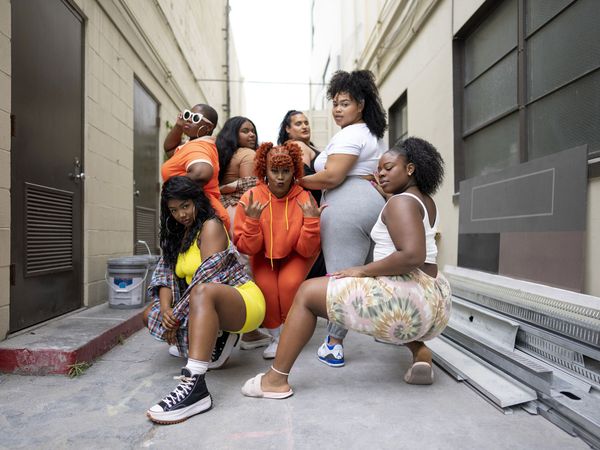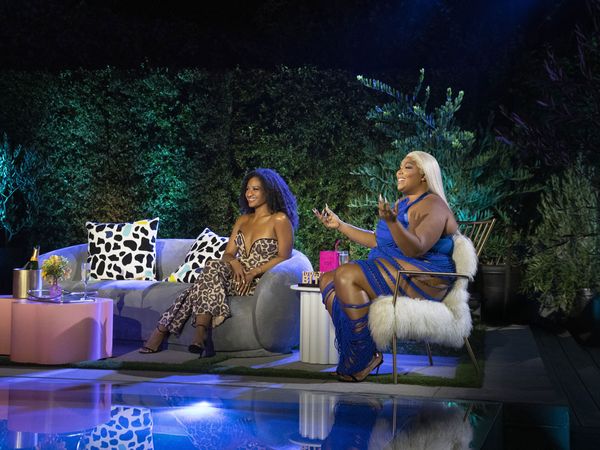
A week before the damning lawsuit filed by three of Lizzo's former dancers went public, a video capturing an audience interaction from her Sydney, Australia concert was posted to TikTok. It shows the "Good As Hell" singer as we know her, talking to a young fan identified as Munroe as she holds aloft a sign reading, "PLS HELP ME SHOW MY HATERS I'M 100% THAT B***H."
When Lizzo asks how she can help, the girl answers, "I get bullied on social media, and they always tell me I'm not good enough because I like to dance and sing and I wanna be like you. I love you."
Lizzo pulls the girl onstage and, putting her arm around Munroe, preaches to her congregation. "The words that we say have a long-lasting effect on people," she says earnestly.
Words also have a way of coming back to haunt us, and once the damning complaints made by her former backup dancers Arianna Davis, Crystal Williams, and Noelle Rodriguez circulated throughout the media, this clip emerged from Down Under and flew around the planet.
The 37-page suit filed this week in the Los Angeles County Superior Court alleges that Lizzo, whose real name is Melissa Viviane Jefferson, along with Shirlene Quigley, the Big Grrls dance captain, and the performer's production company, Big Grrrl Big Touring, Inc. (BGBT) fostered a toxic work environment.
It accuses various parties in the lawsuit of engaging in racial harassment, religious harassment, and disability discrimination. Not all the allegations name Lizzo, but some of the most disheartening, including a claim of fat-shaming, refer directly to her.
"I just adore Lizzo. She's such a genuine person," one TikTok user commented in response to Munroe's concert video.
That was a week ago. How's that fan feeling now?
The accusations are an extreme mismatch with the public image Lizzo uses to evangelize body positivity and inclusion, one she's also monetized into, among other things, an Emmy-winning TV series, Prime Video's "Watch Out for the Big Grrls"; an HBO documentary "Love, Lizzo," which premiered over Thanksgiving weekend in 2022; a line of shapewear; and a Baby Yoda-cuddling cameo in the recent season of "The Mandalorian."
Above all, the details in the lawsuit also contradict the feelings Lizzo cultivates in her live performances, gatherings where anyone who feels like an outcast – Black folks, queer folks, fat folks, any person of color who feels othered, but also lots of white folks – is encouraged to celebrate their worth and affirm it in those around them.
This is not a defense of Lizzo or whatever behavior she may or may not have engaged in. The performer's attorney and damage control specialist Marty Singer has a long history of building successful PR strongholds for his clients and is on the march as you read this.
Rather, this is meant to illustrate how effectively she transformed the public derision she's experienced into marketable positivity. Lizzo's version can be intoxicating, inspiring and transformational, which has always been why countless detractors, primarily fatphobic, misogynistic men, make gunning for her a hobby. She acknowledges this in her response to the lawsuit's allegations.
"These last few days have been gut-wrenchingly difficult and overwhelmingly disappointing," she stated in an Instagram post. "My work ethic, morals, and respectfulness have been questioned. My character has been criticized. Usually I choose not to respond to false allegations but these are as unbelievable as they sound and too outrageous to not be addressed."
— FOLLOW @YITTY (@lizzo) August 3, 2023
All of it stirs up a stew of complex emotions.
In her statement, Lizzo describes the plaintiffs as "former employees who have already publicly admitted they were told their behavior on tour was inappropriate and unprofessional."

This also makes them attractive interview subjects on shows like "Good Morning America," where they appeared on Friday. Before that Chris Cuomo spoke to them for the Aug. 2 episode of his NewsNation show.
However, this isn't a typical high-profile civil suit. It's one involving a star who built her career on getting fans emotionally invested in their self-worth by positioning herself a model to emulate. Musicians' fandoms are notoriously devoted to their favorite singers regardless of whatever sins they may be publicly accused of, setting up Davis, Williams and Rodriguez for a hellish ride as this plays out.
On the other side, the singer's detractors immediately began cackling "I told you so" through an array of memes and posts, although their delight has almost nothing to do with the implications that Lizzo's brand may be built on a sham.
No, their joy in her troubles is a new version of the same taunts they've always used to hound her. The meanness outlined in the suit simply augments these trolls' attacks, especially the claim that Lizzo called attention to Davis' weight gain before publicly firing her.
In their view, Lizzo's main crime was and is being a fat, dark-skinned Black woman who doesn't fit their prescribed picture of health and attractiveness. Now they can also claim she's a fraud.
Celebrities let their fans down all the time by letting their masks slip, sometimes revealing their personas to be entirely manufactured. But Lizzo so effectively welded her full self with our popular concept of self-love and mutual support as to become a kind of self-improvement avatar. This is only a mistake if the person doing it fails to live that mantra in every moment even while being an exacting performer.
That sounds exhausting and impossible, and my saying this may come across as feeling sorry for Lizzo. Again, not so. It's merely acknowledging that, if a jury were to find these allegations plausible, her contradictory backstage behavior reveals a lack of awareness that made such a stumble inevitable.
And the plaintiffs' attorney, Ron Zambrano knows this. "The stunning nature of how Lizzo and her management team treated their performers seems to go against everything Lizzo stands for publicly, while privately she weight-shames her dancers and demeans them in ways that are not only illegal but absolutely demoralizing," he said in a press release.
While this controversy is in its early stages, the breathless coverage related to this complaint generates a similar malevolent energy to the version that met the downfalls of Ellen DeGeneres and Martha Stewart before her.
There are key distinctions between Lizzo's legal woes and the firestorms surrounding DeGeneres and Stewart. For one thing, DeGeneres's spitefulness had fueled rumors for years. Stewart never apologized for her hard-driving nature off-camera and, unlike DeGeneres, never claimed niceness as her brand, only skill and a passion for quality.
But both are highly visible successful women who in various ways became barometers for our culture's unease with influential women, something they have in common with Lizzo – who, like DeGeneres, chose to also embody kindness.
They're also white women. Lizzo is not.
Then there's the Bananenbar of all, described in the part of the lawsuit in which Davis describes a supposedly non-mandatory afterparty in Amsterdam's Red Light district. There the star is alleged to have invited cast members to take turns touching the nude performers, "[catch] dildos launched from the performers' vaginas, and [eat] bananas protruding from the performers' vaginas." Davis said Lizzo goaded her into participating against her will along with other co-workers.

It will be worth monitoring how far the commentariat takes this part of the story considering the decades upon decades of rock and hip-hop tour misbehavior that was equally as wrong, or criminally worse, and valorized because those doing the partying were and are men. Lizzo is not.
"I am very open with my sexuality and expressing myself," Lizzo says in her statement, "but I can not accept or allow people to use that openness to make me out to be something I am not."
Still, in the wake of all of this, the folks I feel for most acutely are those who invested in Lizzo's message and will watch everyone involved — Lizzo, Davis, Williams and Rodriguez — be dragged by the same cretins who would behave hatefully toward them. A person doesn't have to be harassed online to get a sense of how little value strangers place on your safety and well-being based on how they harangue people who look like you and speak out against mistreatment.
We've long passed the "believe all women" era of #MeToo – Depp v. Heard definitively killed it – but destroying Black women never goes out of style. With this case, we're presented with a situation that promises collateral damage on top of whatever loss of monetary, social and professional capital Lizzo, Davis, Williams and Rodriguez may experience as a result.
In the direct wake of the lawsuit going public, for example, Beyoncé reportedly let Lizzo's name drop out of her performance of the "Break My Soul" remix during her Tuesday performance in Boston. The pop luminary doesn't tend to publicly comment on much, but if that was intentional, it amounts to a loud one.
Provided this civil suit is settled out of court, which is likely, how we feel about Lizzo is bound to shift regardless. Corroborating social media posts from other dancers and Sophia Nahli Allison, a filmmaker who briefly worked on "Love, Lizzo" and says she "witnessed how arrogant, self-centered and unkind she is," take the shine off her positivity aura, aka the product, and the vibes fueling it. "Notice how the documentary ended up being directed by a cis white man," Allison wrote, referring to director Doug Pray.
And yet the product's success – that unspoken understanding that Lizzo creates temporary spaces where everyone is welcomed, appreciated and respected – is undeniable. The engine may be a fractured illusion, but the electricity it generates is palpable.
So the quandary this scandal poses isn't merely a matter of separating the art from the artist. Music fans are experts at that. Instead, it may challenge us to integrate the truth of who the artist is when her fans aren't watching into the character we love to see her play onstage for our benefit.







